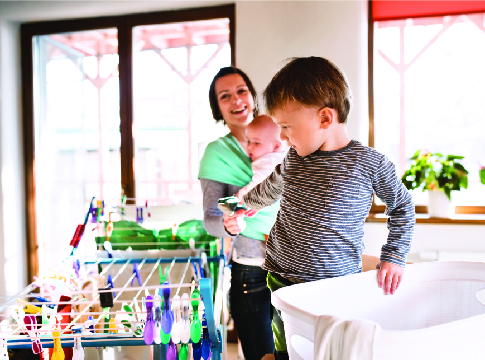Related News
Related News
-
Sustainability Snapshot - Celebrating Energy Efficiency Projects in the Community
Sustainability Snapshops highlight impactful projects completed by EWEB's Customer Solutions department, as a way to celebrate the meaningful work happening behind the scenes.
Find Out More -
EWEB Sets 2026 Budget and Rates, Advances Evaluation of McKenzie Valley Service Territory Realignment
Taken together, the 2026 budget and rate adjustments and the territory-realignment evaluation reflect EWEB’s dedication to responsible financial stewardship, modern, resilient utility infrastructure, and thoughtful planning for the future.
Find Out More -
EWEB secures $2.5 billion of reliable, affordable, carbon-free energy for customers
The new contract with EWEB’s largest energy supplier, the Bonneville Power Administration, forms the foundation of a diverse energy portfolio.
Find Out More -
EWEB Hometown Heroes compete internationally
Out of 290 teams from 14 different countries, EWEB's Lineman Rodeo team places in the top third of competitors.
Find Out More -
Let's Talk Turkey. Is your family ready for winter?
We're heading into the holidays, but that also means snow, ice, and not-so-nice weather might be in the forecast. Here are some tips to prepare in advance.
Find Out More -
The Bonneville Power Administration Rate Change and Your EWEB Bill
BPA’s finalized rate increase is smaller than projected, and EWEB’s pass-through adjustment effective October 1, 2025 will now be 2.7% for residential customers—down from the anticipated 4%.
Find Out More -
Join the Pledge to Prepare
When you think about getting ready for an emergency, you probably have questions. You aren't alone. Preparing for emergencies can be overwhelming, which is why EWEB has put together a 12-month program to help you and your family get two weeks ready.
Find Out More -
You can’t predict the next disaster, but you can prepare
The earthquake lasted less than a minute. But now the power’s out. The tap runs dry. Cell service is spotty. Would you be ready?
Find Out More -
EWEB completes helicopter installation of salmon habitat features
EWEB adds downed trees and 2,000 tons of gravel to the Uupper McKenzie River below Tamolitch Falls to improve spawning habitat.
Find Out More -
Court rules in favor of EWEB in Carmen-Smith litigation
The U.S. District Court in Eugene has granted EWEB's motion to dismiss a lawsuit brought under the Endangered Species Act pertaining to fish passage at EWEB’s Trail Bridge Dam. The favorable ruling clears the way for EWEB to continue advancing towards implementation of permanent fish passage at the dam.
Find Out More -
EWEB proposes modified plan for permanent fish passage at Trail Bridge Dam
After eight months of extensive collaboration and analysis with scientific experts at two federal regulatory agencies, EWEB is proposing an improved plan to build permanent fish passage facilities at Trail Bridge Dam on the McKenzie River.
Find Out More -
Sustainability Snapshot - Ideal Steel July 2025
Our second Sustainability Snapshop highlights a project where EWEB helped a local industrial warehouse upgrade over 1,000 flourescent lights to new efficient LEDs.
Find Out More -
EWEB prepares for wildfire season with risk mitigation measures
EWEB is building a more resilient electric system to weather various types of disasters, from wildfire to winter storms.
Find Out More -
EWEB Pilots New Line Safety Program for 4th graders.
This year, EWEB is ramping up power line safety for children, specifically 4th graders.
Find Out More -
Improving habitat resiliency throughout the Upper McKenzie
Environmental Responsibility is a core guiding value for EWEB decision-making. This summer, EWEB continues its commitment to environmental stewardship with a robust slate of habitat enhancement updates throughout the upper McKenzie River, across the footprint of the Carmen-Smith Hydroelectric Project.
Find Out More - Show More
Three Steps to a More Climate-Friendly Home
September 27, 2019

Here in Eugene, we are fortunate to have access to clean, abundant power and water. But climate change poses risks to our community's energy and drinking water supplies and infrastructure.
As the climate changes, rising temperatures and extreme weather events impact the availability, reliability and costs of the energy and water our community relies on. You might be surprised to learn that you can take meaningful steps at home to help mitigate the impacts of climate change, many of which will save you money over time while reducing carbon emissions.
Step #1: Use less energy. Energy conservation and efficiency is the cheapest and fastest way to help the climate. Homes that use less energy rely less on the grid and produce lower greenhouse gas emissions. Insulating homes, installing LED lighting and upgrading to high-efficiency electric heating and cooling systems offer the added benefit of increasing comfort while saving money. We offer rebates and loans to help with efficiency upgrades for homes and businesses.
Step #2: Use energy off peak. Although EWEB's energy portfolio is composed almost entirely of carbon-free power, we are part of a highly integrated regional energy grid that includes coal and natural gas. When the highest ("peak") level of electricity is being used in the region, there is more of this carbon-intensive energy on the grid. Shifting your energy use to "off peak" can be as simple as running the dishwasher, charging your electric car, or doing the laundry later at night (after 9 p.m.) or mid-day (between noon and 5 p.m). Learn more about peak power.
Step #3: Watch your water use. It takes a lot of energy to treat and deliver the water you use every day. It takes even more energy to turn it into hot water. Saving water saves energy, which in turn reduces greenhouse gas emissions. Fixing leaks around the house, taking shorter showers, and planting "water wise" landscapes are also great ways to take care of our water source, the beautiful McKenzie River.

